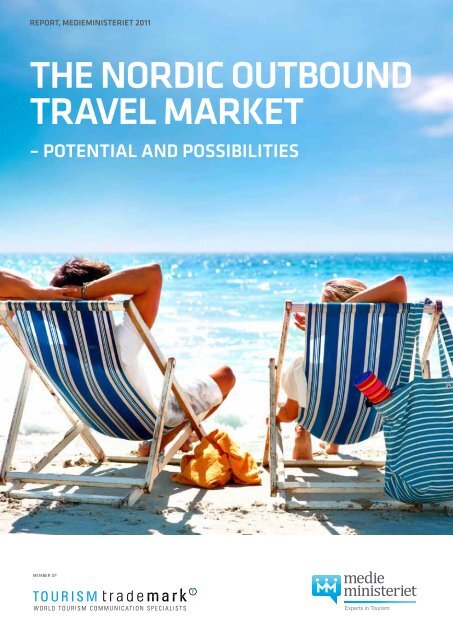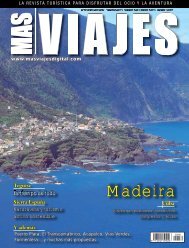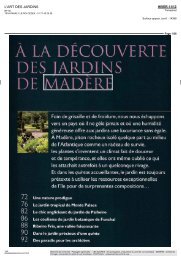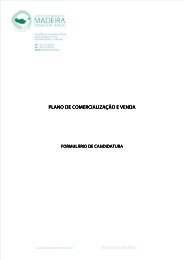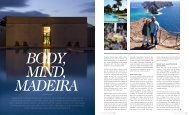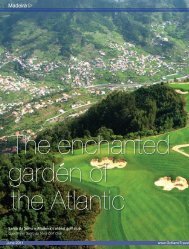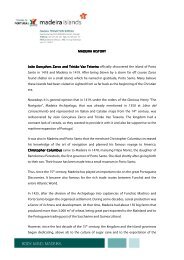The Nordic outbound travel market
the nordic outbound travel Market
the nordic outbound travel Market
Create successful ePaper yourself
Turn your PDF publications into a flip-book with our unique Google optimized e-Paper software.
eport, Medieministeriet 2011<br />
<strong>The</strong> <strong>Nordic</strong> <strong>outbound</strong><br />
<strong>travel</strong> <strong>market</strong><br />
– Potential and possibilities<br />
Member of:
Readers’<br />
guide<br />
Why invest<br />
in the <strong>Nordic</strong><br />
countries?<br />
02<br />
<strong>The</strong> report covers the <strong>outbound</strong> <strong>travel</strong><br />
<strong>market</strong> in the <strong>Nordic</strong> Countries: Sweden,<br />
Denmark, Finland and Norway. Differences<br />
between the <strong>Nordic</strong> countries are relatively<br />
small, so all essential points cover all four<br />
<strong>market</strong>s. Country specific information is<br />
marked in italics.<br />
All chapters start with a summary of the<br />
most important points. This is followed by<br />
a more extensive review of the subject.<br />
<strong>The</strong> report is based on extensive research<br />
carried out in May-June 2011. All research<br />
sources are listed at the back.<br />
• <strong>Nordic</strong> countries are the third largest <strong>outbound</strong><br />
<strong>travel</strong> <strong>market</strong> in Europe.<br />
• <strong>Nordic</strong> tourists spend 90 % more money than the average<br />
European tourist on food, accommodation and<br />
attractions while on holiday.<br />
• <strong>Nordic</strong> tourists have 5-6 weeks holiday each year.<br />
• <strong>The</strong> level of income in the <strong>Nordic</strong> countries is generally<br />
high – and a record-high percentage of income is spent on<br />
<strong>travel</strong>ling.<br />
• <strong>Nordic</strong> tourists are the best tourists in the world in terms<br />
of adaptability to foreign cultures.<br />
• On average around 60 % of the <strong>Nordic</strong> people take<br />
at least one vacation each year.
Introduction<br />
Contents<br />
04<br />
Medieministeriet has been working with the<br />
tourism and <strong>travel</strong> <strong>market</strong> for quite some<br />
time, and throughout this period we have<br />
experienced an increasing demand for more<br />
information about the <strong>Nordic</strong> <strong>outbound</strong><br />
<strong>travel</strong> <strong>market</strong> among our clients and<br />
partners.<br />
This report should answer most questions<br />
about <strong>Nordic</strong> tourists and their great<br />
potential for the global tourism industry. Our<br />
goal is to introduce <strong>Nordic</strong> tourists to those<br />
who do not know them, explain who they<br />
are, how they act and what they prefer. And<br />
to explain the great potential of this<br />
particular <strong>market</strong>.<br />
In order to make the report relevant for as<br />
many parties as possible, it covers general<br />
tendencies across the four countries. We<br />
hope this can serve as a foundation when<br />
planning a strategy towards the <strong>Nordic</strong><br />
<strong>market</strong>.<br />
If you want more detailed information, or<br />
if you want to know more about what this<br />
means for your destination, country or hotel,<br />
you are always welcome to contact us.<br />
Yours sincerely,<br />
Henrik Koch<br />
CEO, Medieministeriet<br />
P. 06<br />
01: <strong>The</strong> <strong>Nordic</strong><br />
Travel Market<br />
p. 10<br />
03: <strong>The</strong> Economic<br />
Situation in the<br />
<strong>Nordic</strong> Countries<br />
p. 24<br />
05: Important<br />
Segments<br />
p. 08<br />
02: <strong>The</strong> <strong>Nordic</strong><br />
Countries<br />
p. 14<br />
04: Travel Habits<br />
p. 28<br />
06: Booking<br />
Behaviour<br />
and Platforms
Summary<br />
01: <strong>The</strong> <strong>Nordic</strong><br />
Travel Market<br />
<strong>The</strong> World’s<br />
Best Tourists<br />
A recent research study revealed that<br />
<strong>Nordic</strong> tourists are the best tourists in the<br />
world - based on ratings in five different<br />
categories:<br />
1. Willingness to speak the local language<br />
2. Polite and approachable<br />
3. Willingness to adapt to local culture<br />
4. Willingness to try the local cuisine<br />
5. Give a generous tip<br />
<strong>Nordic</strong> tourists take the lead when it comes<br />
to willingness to speak the local language,<br />
and they come in second in the next three<br />
categories: polite and approachable,<br />
willingness to adapt to local culture and<br />
willingness to try the local cuisine.<br />
When it comes to giving a generous tip,<br />
<strong>Nordic</strong> tourists are only number four, but<br />
since they are so well represented in all<br />
other categories they earn the right to call<br />
themselves “the best”.<br />
06<br />
01: <strong>The</strong> <strong>Nordic</strong><br />
Travel Market<br />
Although the <strong>Nordic</strong> countries<br />
are sparsely populated, with<br />
only 25 million inhabitants,<br />
the <strong>Nordic</strong> region is a highly<br />
important <strong>market</strong> for <strong>outbound</strong><br />
<strong>travel</strong>, making it the<br />
third largest <strong>outbound</strong><br />
<strong>market</strong> in Europe.<br />
<strong>The</strong>y are big spenders<br />
<strong>Nordic</strong> <strong>travel</strong>lers spend more than USD<br />
20 billion on <strong>travel</strong>ling each year.<br />
Currently, <strong>travel</strong> spending per capita in<br />
the <strong>Nordic</strong> countries is among the<br />
highest in the world, far surpassing<br />
spending in Germany and England.<br />
<strong>The</strong>y are frequent <strong>travel</strong>lers<br />
<strong>The</strong> high spending power facilitates<br />
frequent <strong>travel</strong>, and almost nowhere<br />
in the world do people <strong>travel</strong> abroad as<br />
often as the <strong>Nordic</strong> tourists.<br />
<strong>The</strong>y journey outside Europe<br />
More and more <strong>Nordic</strong> <strong>travel</strong>lers<br />
(currently more than 18 %) head beyond<br />
the borders of Europe each year in search<br />
for leisure and culture.<br />
<strong>The</strong>y plan more holidays<br />
Statistics show that the <strong>Nordic</strong> tourists<br />
are planning more holiday <strong>travel</strong>s in 2011.
02: the <strong>Nordic</strong><br />
countries<br />
08<br />
02: <strong>The</strong> <strong>Nordic</strong><br />
Countries<br />
Sweden<br />
Population: 9.4 million people<br />
Capital: Stockholm (1,900,000 people)<br />
Vacation: 6 weeks holiday each year<br />
Denmark<br />
Population: 5.5 million people<br />
Capital: Copenhagen (1,182,000 people)<br />
Vacation: 5-6 weeks of holiday each year<br />
Finland<br />
Population: 5.4 million people<br />
Capital: Helsinki (1,364,000 people)<br />
Vacation: 5-6 weeks of holiday each year<br />
Norway<br />
Population: 4.9 million people<br />
Capital: Oslo (599,000 people)<br />
Vacation: 5-6 weeks of holiday each year
03: <strong>The</strong> Economic<br />
Situation in the<br />
<strong>Nordic</strong> Countries<br />
10<br />
03: <strong>The</strong> Economic<br />
Situation in the<br />
<strong>Nordic</strong> Countries<br />
Summary<br />
Frequent Travellers<br />
– Big Spenders<br />
<strong>The</strong> level of income in the <strong>Nordic</strong><br />
countries is generally high – and a<br />
record-high percentage of income is<br />
spent on <strong>travel</strong>ling. <strong>Nordic</strong> tourists’ per<br />
capita <strong>travel</strong> spending is among the<br />
highest in the world and they <strong>travel</strong><br />
abroad more frequently than other<br />
tourists in the world.<br />
Over the past ten years, the <strong>Nordic</strong><br />
countries have had a noticeably greater<br />
increase in GDP than the average for<br />
Western Europe, and this is expected to<br />
continue in 2011. <strong>Nordic</strong> tourists’ private<br />
consumption is also seeing a positive<br />
trend.<br />
Since there is a close correlation between<br />
people’s private consumption and<br />
holiday consumption, this will have a<br />
positive influence on the amount of<br />
money spent on holiday <strong>travel</strong>s to<br />
foreign destinations by <strong>Nordic</strong> tourists.
Forecast for growth of the <strong>Nordic</strong><br />
countries’ GDP in local value<br />
GPD<br />
2011<br />
2012<br />
2013<br />
2014<br />
2015<br />
SWEDEN<br />
+3.1 %<br />
+2.9 %<br />
+2.8 %<br />
+2.5 %<br />
+2.4 %<br />
12<br />
High Level of Income<br />
DENmark<br />
FINLAND<br />
+2.2 %<br />
+2.9 %<br />
+2.3 %<br />
+2.7 %<br />
+2.4 %<br />
*<br />
+2.4 %<br />
*<br />
+2.3 %<br />
*<br />
03: <strong>The</strong> Economic<br />
Situation in the<br />
<strong>Nordic</strong> Countries<br />
<strong>The</strong> <strong>Nordic</strong> countries differentiate<br />
themselves from other countries by<br />
combining high standards of living and<br />
a relatively even distribution of income.<br />
However, the financing of the <strong>Nordic</strong><br />
welfare model entails a heavy tax burden<br />
and a major redistribution of income<br />
compared to most other countries<br />
throughout the world. <strong>The</strong> level of income<br />
is generally high – and differences in<br />
income levels are relatively small in the<br />
<strong>Nordic</strong> countries compared to other OECD<br />
countries.<br />
<strong>The</strong> <strong>Nordic</strong> economy is the 9th largest<br />
economy in the world, surpassed only<br />
slightly in size by Canada and Spain. <strong>Nordic</strong><br />
tourists spend almost USD 700 billion<br />
each year with a record-high percentage of<br />
that sum pertaining to <strong>travel</strong> and tourism<br />
outside their own countries.<br />
Economic Growth<br />
Economic growth in terms of gross<br />
domestic product (GDP) is a good indicator<br />
for activity in business. This variable has<br />
an apparent correlation with business<br />
<strong>travel</strong>, but it also influences people’s<br />
holiday <strong>travel</strong>. <strong>The</strong> development in GDP<br />
has an impact on elements such as people’s<br />
wages, unemployment etc. and therefore<br />
also on people’s private consumption, which<br />
will affect people’s holiday consumption.<br />
Over the past ten years,<br />
the <strong>Nordic</strong> countries had a<br />
noticeably larger increase<br />
in GDP than the average in<br />
Western Europe.<br />
Larger GDP-increase than the<br />
Western Europe-average<br />
Over the past ten years, the <strong>Nordic</strong><br />
countries had a noticeably larger increase<br />
in GDP than the average in Western Europe<br />
(the 15 EU countries before enlargement).<br />
Measured by GDP per capita, the <strong>Nordic</strong><br />
countries have a higher wealth than the<br />
EU-15. Norway’s GDP per capita is as high<br />
as 60 % above the EU-15 average, and<br />
Norway is actually one of the countries<br />
with the highest standard of living.<br />
NORWAY<br />
Private<br />
Consumption<br />
SWEDEN<br />
DENAMrk<br />
FINLAND<br />
NORWAY<br />
+2.3 %<br />
* Figures not available<br />
Source: Oxford Economics<br />
2011<br />
+2.4%<br />
+2.1 %<br />
+2.9 %<br />
+2.5 %<br />
+2.6 %<br />
2012<br />
+2.6 %<br />
+2.2 %<br />
*<br />
+2.5 %<br />
+2.7 %<br />
2013<br />
+2.6 %<br />
+2.1 %<br />
*<br />
+2.2 %<br />
+2.6 %<br />
Forecast for growth of <strong>Nordic</strong><br />
tourists’ private consumption<br />
Private consumption is determined by people’s income to savings ratio.<br />
* Figures not available<br />
Source: Oxford Economics<br />
2014<br />
+2.5 %<br />
+2.1 %<br />
*<br />
+2.1 %<br />
+2.4 %<br />
2015<br />
+2.5 %<br />
+2.1 %<br />
*<br />
+2.2 %
04:<br />
Travel<br />
Habits<br />
14<br />
04: Travel Habits<br />
Summary<br />
Looking for Luxury and Unique<br />
Experiences<br />
<strong>The</strong> <strong>Nordic</strong> tourists <strong>travel</strong> a lot and they<br />
will be <strong>travel</strong>ling more in 2011 than in<br />
recent years.<br />
About 50 % of all their <strong>travel</strong>s are to<br />
foreign countries and overseas holiday<br />
<strong>travel</strong> will become more popular in the<br />
future.<br />
<strong>The</strong> <strong>Nordic</strong> countries are the third largest<br />
<strong>outbound</strong> <strong>market</strong> in Europe.<br />
<strong>Nordic</strong> tourists are looking for a warm<br />
climate and cultural experiences when<br />
<strong>travel</strong>ling, while package tours and city<br />
breaks are especially popular.<br />
<strong>The</strong>y are becoming more and more<br />
demanding and will increasingly look for<br />
unique <strong>travel</strong> experiences in the future.<br />
Numbers<br />
don’t lie<br />
• In 2009, Swedish leisure <strong>travel</strong>lers spent<br />
an average of 100 euro per person per day<br />
• In 2005, Norwegians took more than six<br />
million vacations to foreign countries and<br />
Norwegian tourists also increased their<br />
average expenditure per person<br />
• In 2006, <strong>Nordic</strong> tourists spent 27 billion<br />
euro on <strong>travel</strong>ling, and that makes<br />
the <strong>Nordic</strong> countries the third largest<br />
<strong>outbound</strong> tourism marked in Europe, in<br />
front of France, Spain and Italy.<br />
• On average, each Danish tourist over the<br />
age of 15 spends about 1,167 euro on<br />
their holiday (including transport,<br />
accommodation and consumption)<br />
• Danish tourists aged 24 to 44 are the<br />
biggest spenders with a <strong>travel</strong> budget of<br />
almost 1,340 euro per holiday<br />
• <strong>The</strong> average holiday budget for Finnish<br />
tourists in 2010 was about 1,500 euro
How much do they<br />
<strong>travel</strong>?<br />
Travelling is a distinction from people’s<br />
everyday life. People from the <strong>Nordic</strong><br />
countries generally experience pressure<br />
during their leisure time, which means that<br />
<strong>travel</strong>ling in the future will involve more,<br />
but shorter trips.<br />
In Norway, there has been an increase of 4.6<br />
% in <strong>travel</strong>ling abroad from 2006-2011 and<br />
since the millennium, Swedes’ holiday <strong>travel</strong><br />
has increased by 17.5 %.<br />
According to new research, 50 % of Swedish<br />
tourists are planning more <strong>travel</strong>s abroad<br />
in 2011 compared to last year. <strong>The</strong> corresponding<br />
figures for Norway and Denmark<br />
are 42 % and 36 % respectively.<br />
16<br />
04: Travel Habits<br />
<strong>Nordic</strong> people have long holidays<br />
compared to other countries. 5-6 weeks<br />
is the average for all four countries. <strong>The</strong>y<br />
often take 3 successive weeks in the<br />
summertime, where they have the time to<br />
<strong>travel</strong> abroad.<br />
Generally, tourists from the <strong>Nordic</strong><br />
countries <strong>travel</strong> a lot and they will be<br />
<strong>travel</strong>ling more in 2011 than in recent years.<br />
• About 50 % of all their <strong>travel</strong>s are to<br />
foreign destinations<br />
• On average, around 60 % of people in the<br />
<strong>Nordic</strong> countries take at least one holiday<br />
each year and the numbers are increasing<br />
During 2009, Finnish residents aged 15-74<br />
made a total of 5.6 million leisure trips<br />
abroad.<br />
How much money<br />
do they spend on<br />
<strong>travel</strong>ling?<br />
Research shows that <strong>Nordic</strong> tourists<br />
spend more money on <strong>travel</strong>ling than any<br />
other European group and the numbers<br />
are increasing each year. <strong>The</strong> research<br />
also shows that after Germany and UK<br />
the <strong>Nordic</strong> countries are the marked that<br />
spends the most money on <strong>travel</strong>ling in<br />
Europe.<br />
Danish <strong>travel</strong> spending has for instance<br />
grown 63 % in just three years.<br />
Swedish tourists’ holiday consumption in<br />
2011 is expected to amount to 11.1 billion<br />
euro, while the Norwegian tourists are<br />
expected to spend 11.9 billion euro.<br />
Research shows that<br />
<strong>Nordic</strong> tourists spend<br />
more money on <strong>travel</strong>ling<br />
than any other European<br />
group and the numbers are<br />
increasing each year.<br />
<strong>Nordic</strong> tourists spend 90 % more money<br />
than the average European tourists on<br />
food, accommodation and attractions while<br />
away on holiday.<br />
<strong>The</strong> average <strong>Nordic</strong> tourist spends<br />
more than 1,000 euro when vacationing<br />
(including transport, accommodation and<br />
consumption).
When and where do<br />
they <strong>travel</strong>?<br />
<strong>The</strong>y <strong>travel</strong> in the summertime<br />
<strong>Nordic</strong> tourists mostly <strong>travel</strong> in the<br />
summer period. Holiday <strong>travel</strong> lasting<br />
more than 4 nights typically occurs in July<br />
and August.<br />
30 % of all Danish vacations in 2010 took<br />
place in July and August. This is almost the<br />
same in Sweden with 32.2 % of all annual<br />
<strong>outbound</strong> <strong>travel</strong>.<br />
possibility for different experiences, which<br />
is also important for <strong>Nordic</strong> tourists.<br />
Approximately one out of four holidays go<br />
to a destination outside Europe and the US<br />
is one of the most popular destinations. It<br />
is mainly in the winter that <strong>Nordic</strong> tourists<br />
make these overseas journeys.<br />
<strong>The</strong>y like a good deal<br />
<strong>Nordic</strong> <strong>travel</strong>ers are very aware of<br />
exchange rates and make good use of the<br />
possibilities this brings.<br />
I.e. the low dollar rate encourages them to<br />
<strong>travel</strong> across the Atlantic.<br />
18<br />
04: Travel Habits<br />
Shorter trips becoming popular<br />
Travel patterns are changing, and the<br />
number of tourists who take more than<br />
one vacation each year is increasing. For<br />
instance, they take city breaks in the Easter<br />
period or autumn holidays, and then a<br />
longer vacation in the summer or during<br />
the winter.<br />
<strong>The</strong>y prefer a warm climate<br />
<strong>Nordic</strong> tourists prefer to <strong>travel</strong> to destinations<br />
with a warm climate where they can<br />
relax and spend time with family, relatives<br />
and friends. Experiencing big cities and<br />
different cultures are other elements that<br />
attract <strong>Nordic</strong> tourists when <strong>travel</strong>ing<br />
abroad.<br />
Popular destinations<br />
<strong>The</strong> most popular holiday destination for<br />
<strong>Nordic</strong> tourists is Spain. However, there<br />
seems to be an increasing interest in<br />
non-European destinations when buying<br />
package tours.<br />
Holiday destinations such as Turkey,<br />
Bulgaria, Egypt and Tunisia are especially<br />
popular. Holiday <strong>travel</strong> to these countries<br />
is typically about 15 % cheaper and the<br />
spending money will last longer.<br />
Thailand is a very popular holiday<br />
destination outside Europe and <strong>Nordic</strong><br />
tourists are among the most frequent<br />
visitors to Thailand relative to the<br />
countries’ populations. This is due to low<br />
prices for flights and hotels – and the<br />
How do they prefer<br />
to <strong>travel</strong>?<br />
<strong>The</strong> most popular forms of <strong>travel</strong> among<br />
<strong>Nordic</strong> tourists are:<br />
• All-inclusive Package Tours<br />
• City Breaks<br />
• Cruises<br />
All-inclusive Package Tours<br />
All-inclusive Package Tours are especially<br />
popular among families with children.<br />
All-inclusive hotels and holiday apartments<br />
are popular due to convenience and the<br />
need to know the exact cost of a holiday.<br />
Travel patterns are<br />
changing, and the number<br />
of tourists who take more<br />
than one vacation each<br />
year is increasing.<br />
<strong>The</strong>re is a widespread tendency among<br />
<strong>Nordic</strong> families with children to have a<br />
greater focus on luxury than before. This<br />
means choosing 4 or 5 star hotels when<br />
booking. Some <strong>travel</strong> agencies are also<br />
experiencing an increase in exclusive<br />
family <strong>travel</strong>, such as safari trips where<br />
parents take their children out on great<br />
adventures.<br />
City Breaks<br />
Generally city breaks are popular all year<br />
round and the increasing supply of lowpriced<br />
flights to popular metropolitan<br />
destinations has affected city breaks’<br />
popularity among <strong>Nordic</strong> tourists.<br />
Destinations such as London and New York<br />
are the most popular. London is attractive<br />
because of cheap flights and New York is<br />
enduringly popular.<br />
<strong>The</strong>re is a widespread<br />
tendency among <strong>Nordic</strong><br />
families with children to<br />
have a greater focus on<br />
luxury than before.<br />
<strong>The</strong> purpose of this kind of break from<br />
everyday life is to feel good, eat well and<br />
do some shopping. Barcelona and Paris are<br />
also popular all year round destinations.<br />
Cruises<br />
Cruises are another form of <strong>travel</strong> that<br />
Danes dream about in particular, and<br />
large ships with relative low prices and<br />
smaller ships with relatively high prices<br />
are popular.<br />
How do they prefer<br />
to stay?<br />
Statistics show that hotels and similar<br />
establishments are the preferred type<br />
of accommodation for Europeans when<br />
vacationing. This is also applicable to<br />
<strong>Nordic</strong> tourists.<br />
54 % of the Danish tourists prefer to stay<br />
at hotels when <strong>travel</strong>ling, while 20 %<br />
lodge with family or friends. 5 % prefer to<br />
go camping, 9 % want to stay in a rented<br />
holiday home and 4 % have their own<br />
holiday property.<br />
Statistics show that 6.6 million Finnish<br />
overnight stays were in hotels, which is an<br />
increase of four percent since 2008. 3.9<br />
million overnight stays were in rented<br />
cottages, which is an increase of three<br />
percent.<br />
Norwegians also prefer hotels as their<br />
first choice of accommodation. 63 % stay<br />
in hotels followed by campsites, rented<br />
holiday homes and other commercial<br />
accommodation.
Career<br />
<strong>travel</strong>lers<br />
As tourism develops, there seems to be<br />
a shift away from purely external <strong>travel</strong><br />
determinations, such as demography and<br />
climate towards internal determinations,<br />
such as self-development and creative<br />
expression.<br />
As people in the <strong>Nordic</strong> countries <strong>travel</strong><br />
more, they also become more aware of the<br />
culture and environment of the places they<br />
visit, and they reflect more on their own<br />
experiences and lifestyle.<br />
As <strong>travel</strong> experiences become richer, they<br />
feed the desire for more <strong>travel</strong>ling. People<br />
are therefore becoming so-called career<br />
<strong>travel</strong>lers, demanding an endless source<br />
of new experiences and looking for deeper<br />
experiences within the communities they<br />
visit.<br />
20<br />
04: Travel Habits
22<br />
04: Travel Habits<br />
What do they want?<br />
According to new research, there are five<br />
important factors when <strong>Nordic</strong> tourists<br />
choose a holiday destination.<br />
• Culture and local people<br />
• Cleanliness<br />
• Active holidays<br />
• Shopping<br />
• Restaurants<br />
<strong>Nordic</strong> tourists are very similar when<br />
it comes to their <strong>travel</strong> habits and<br />
preferences.<br />
What will they be<br />
looking for?<br />
New perspectives<br />
As people in general <strong>travel</strong> more and<br />
gain greater insights through their own<br />
experiences and the Internet, they also<br />
become more demanding in relation to<br />
future vacations. Overseas <strong>travel</strong> and<br />
unique <strong>travel</strong> experiences are future <strong>travel</strong><br />
trends among <strong>Nordic</strong> tourists.<br />
<strong>Nordic</strong> tourists want experiences that give<br />
new perspectives in their lives. <strong>The</strong>y will<br />
still <strong>travel</strong> to popular Spain, but there will<br />
be an increasing interest and desire to<br />
<strong>travel</strong> to more exotic destinations.<br />
USA and Canada will remain popular, but<br />
other destinations such as Brazil, Australia,<br />
Japan and exotic places as Samoa and East<br />
Timor will be popular <strong>travel</strong> destinations<br />
in the future.<br />
Unique experiences<br />
Unique experiences that have not been<br />
tried before will become more popular.<br />
This could be a culinary experience, such<br />
as cooking local meals.<br />
Travel Forms<br />
Important<br />
Factors<br />
Activities<br />
Preferred<br />
Transport<br />
Sweden<br />
Package tour<br />
City breaks<br />
Climate<br />
Cleanliness<br />
Culture<br />
Sunbathing<br />
Swimming<br />
Shopping<br />
Air <strong>travel</strong><br />
Denmark<br />
Package tour<br />
City breaks<br />
Climate<br />
Culture<br />
Local People<br />
Relaxing<br />
Sightseeing<br />
Shopping<br />
Restaurants<br />
Air Travel<br />
Finland<br />
Package tour<br />
City breaks<br />
Climate<br />
Culture<br />
Shopping<br />
Sports<br />
Air Travel<br />
Norway<br />
Package tour<br />
City breaks<br />
Climate<br />
Cleanliness<br />
Culture<br />
Relaxing<br />
Shopping<br />
Sports<br />
Air Travel<br />
Remote destinations are also expected to<br />
become more popular.<br />
Sustainability, wellness and<br />
authenticity<br />
<strong>Nordic</strong> tourists will be more climateconscious<br />
in terms of sustainability and<br />
they will also search for <strong>travel</strong> forms that<br />
include wellness activities.<br />
In addition, authentic experiences will be<br />
popular such as meeting local people in<br />
their local surroundings and participating<br />
in volunteer activities. Volunteering is also<br />
popular since students can accumulate<br />
points in relation to their education.
24<br />
05: Important<br />
Segments<br />
05: Important<br />
Segments<br />
<strong>The</strong>re are three important segments with<br />
great potential when entering the <strong>Nordic</strong><br />
<strong>travel</strong> <strong>market</strong>.<br />
<strong>The</strong>y are:<br />
• Families with children<br />
• Singles with no children<br />
• Empty Nesters<br />
Travel activity is increasing for all groups.<br />
This chapter will highlight the most<br />
important characteristics in terms of <strong>travel</strong><br />
habits and potential.<br />
Families with<br />
children<br />
Families with children are an important<br />
segment in the <strong>outbound</strong> tourism <strong>market</strong>.<br />
<strong>The</strong>se families typically use the school<br />
holidays to be together and to experience<br />
things together because the parents have<br />
less and less time.<br />
Why do they go?<br />
<strong>The</strong> most important aspects for these<br />
families when <strong>travel</strong>ling are:<br />
• <strong>The</strong> children should have fun<br />
• <strong>The</strong> family should have shared<br />
experiences<br />
• <strong>The</strong> parents want to relax<br />
• <strong>The</strong> parents need time with their children<br />
• <strong>The</strong> children should be active<br />
Previously, holiday destinations were the<br />
most important aspect when families were<br />
choosing a holiday. This is no longer the<br />
case. <strong>The</strong>re is an increasing tendency for<br />
families to focus more on luxury, which<br />
includes booking 4-5 star hotels with<br />
child-friendly facilities. Families want to<br />
retain the same good standards that they<br />
have at home.<br />
All-inclusive is key<br />
This is closely related to the fact that allinclusive<br />
holidays are becoming more<br />
popular among families in the <strong>Nordic</strong><br />
region.<br />
<strong>The</strong> majority of <strong>Nordic</strong> tourists who take<br />
all-inclusive holidays are families with<br />
children, and the reasons for choosing<br />
these are convenience and control over<br />
expenses. Five years ago, only 3 % of<br />
all package-tour <strong>travel</strong>lers preferred<br />
all-inclusive holidays, but the numbers<br />
are increasing and in 2010, the figure in<br />
Denmark alone was more than 15 %.<br />
Holiday destinations such as Egypt<br />
and Turkey are popular among packagetour<br />
<strong>travel</strong>lers because of low priced<br />
all-inclusive offers.<br />
Five years ago, only 3 % of<br />
all package-tour <strong>travel</strong>lers<br />
preferred all-inclusive<br />
holidays, but the numbers<br />
are increasing and in 2010,<br />
the figure in Denmark<br />
alone was more than 15 %.<br />
Child friendly and safe<br />
Another important factor for <strong>Nordic</strong><br />
families is that they discover child-friendly<br />
places when deciding where to stay. <strong>The</strong>y<br />
consider a place child-friendly when they<br />
are secure, employ staff with a positive<br />
attitude towards children, have access<br />
to water parks, playgrounds and childfriendly<br />
menus at restaurants.
26<br />
05: Important<br />
Segments<br />
Singles<br />
Singles either <strong>travel</strong> with other singles<br />
or they go alone, which more and more<br />
singles are daring to try.<br />
Single culture is growing, and a large<br />
proportion of singles have no children.<br />
This makes singles’ holiday <strong>travel</strong> a<br />
growing industry.<br />
More and more dare to<br />
<strong>travel</strong> alone<br />
Research carried out by a dating site<br />
showed that 30 % of male respondents<br />
and 26 % of female respondents are<br />
open towards singles’ vacations and have<br />
considered taking one.<br />
Singles holiday <strong>travel</strong>ling is a tendency that<br />
can be compared to dating on the Internet:<br />
it was considered taboo 10 years ago, but<br />
today it is a well-known phenomenon.<br />
Singles’ camping is also a new tendency<br />
that more and more people are trying.<br />
Why do they go?<br />
<strong>The</strong> advantages of singles’ holidays are<br />
freedom and social interaction between<br />
single <strong>travel</strong>lers. Only 30 % of the women<br />
and half of the men would <strong>travel</strong> to find<br />
a partner. Instead, the majority choose<br />
singles vacations in order to find new<br />
friends and share experiences.<br />
Empty Nesters<br />
Empty nesters are adult couples, aged 45+ with<br />
no children living at home.<br />
This group used to focus their time on<br />
their children and grandchildren, but in<br />
the future they will spend more time on<br />
themselves, and the biggest share of their<br />
leisure time consumption will be on <strong>travel</strong>.<br />
It is expected that the<br />
empty nester segment<br />
will make up 21 % of the<br />
world’s population by<br />
2050.<br />
A growing segment<br />
Empty nesters are a rapidly growing<br />
segment globally and in all the <strong>Nordic</strong><br />
countries<br />
It is expected that the segment will make<br />
up 21 % of the world’s population by 2050.<br />
In Denmark, the number of people over 60<br />
will make up 33 % of the Danish population.<br />
This makes them very interesting for the<br />
<strong>outbound</strong> <strong>travel</strong> <strong>market</strong>.<br />
<strong>The</strong>y have money and are<br />
ready to spend it<br />
Empty nesters will typically have paid<br />
off their mortgages, while also owning<br />
countryside cottages and possibly holiday<br />
homes abroad. <strong>The</strong>y are generally a<br />
wealthy segment of society and they spend<br />
slightly more money than other tourists<br />
when on vacation.<br />
<strong>The</strong>y also take longer vacations and most<br />
of them are able to <strong>travel</strong> outside of peak<br />
season, for instance in September, April<br />
and May since they are no longer working.<br />
• 48 % prefer to stay in holiday apartments<br />
• 30 % prefer hotels without children<br />
Why do they go?<br />
<strong>The</strong>re are many different types of couples,<br />
with different needs when <strong>travel</strong>ling.<br />
Generally, empty nesters are <strong>travel</strong>ling to<br />
have experiences and they will not waste<br />
their time relaxing in a hammock. Instead,<br />
they want to take different trips that<br />
are more physically demanding, such as<br />
cycling and hiking in the countryside.<br />
More than half want to make unusual trips<br />
to have holiday experiences. Living in the<br />
centre and dining at restaurants are also<br />
highly preferred among this segment.<br />
Research shows that<br />
• 56 % mention renewed energy as one<br />
element they get out of their holiday<br />
• 33 % emphasise time for romance<br />
• 30 % state they strengthen their<br />
relationship<br />
Empty nesters are an<br />
attractive target group<br />
due to the fact that they<br />
• Have a great desire to <strong>travel</strong><br />
• Have a lot of money<br />
• Spend more money than the average<br />
tourist<br />
• Take longer vacations<br />
• Can take vacations outside the peak<br />
season
06: Booking<br />
Behaviour and<br />
Platforms<br />
28<br />
06: Booking Behaviour<br />
and Platforms<br />
Summary<br />
Information Searchers<br />
– Online Bookers<br />
<strong>The</strong> <strong>Nordic</strong> countries are at the forefront<br />
when it comes to penetration and use of<br />
Information and communication<br />
technologies (ICT).<br />
<strong>Nordic</strong> tourists are therefore well<br />
acquainted with and heavy users of all<br />
the new communication platforms.<br />
This means that online information<br />
searches on the Internet are increasing<br />
and an average of 60 % book their<br />
vacations online.<br />
<strong>Nordic</strong> tourists prefer booking online<br />
because it is flexible and they can search<br />
and plan their holiday exactly the way<br />
they want it, and they can do it<br />
whenever it fits their busy schedule.<br />
<strong>The</strong> high level of ICT penetration also<br />
means that social and mobile media<br />
play an important role when tour<br />
operators are inspiring or communicating<br />
with potential tourists.
30<br />
06: Booking Behaviour<br />
and Platforms<br />
Planning and<br />
Booking<br />
Active Online Searchers<br />
<strong>Nordic</strong> tourists gather more information<br />
than the average European tourist.<br />
Information searches on the Internet are<br />
increasing and an average of 60 % book<br />
their vacations online. In Norway, <strong>travel</strong><br />
and holidays are the most bought or<br />
ordered products online.<br />
Booking should be flexible<br />
<strong>Nordic</strong> tourists prefer booking online<br />
because it is flexible and they can search<br />
and plan their holiday exactly the way they<br />
want it, and they can do it whenever it fits<br />
their busy schedule.<br />
• 63 % are satisfied with planning their<br />
holiday themselves<br />
• 57 % used three or more websites to<br />
plan their holiday<br />
• 39 % will definitely plan their next<br />
holiday themselves<br />
Increased use of online booking also<br />
means that people have expectations in<br />
relation to making a good deal, for instance<br />
when booking a hotel room.<br />
<strong>The</strong> women make the decisions<br />
Research shows that women take the lead<br />
when vacations are being planned and<br />
booked. 4-5 years ago only one in four<br />
women decided on the holiday.<br />
This is primarily because women are<br />
more comfortable using the Internet when<br />
buying goods online, including holiday<br />
<strong>travel</strong>.<br />
Women handle all the preliminary work,<br />
searching the Internet, reading magazines<br />
and speaking to friends and relatives to<br />
gain inspiration about their own vacation.<br />
Research shows that<br />
women take the lead<br />
when vacations are being<br />
planned and booked. 4-5<br />
years ago only one in four<br />
women decided on the<br />
holiday.<br />
Children have some influence, especially<br />
when it comes to taking the initiative, but<br />
they have less say than their parents in the<br />
decision making process.<br />
<strong>The</strong> most important sources of<br />
information<br />
<strong>The</strong> most important sources of<br />
information/reasons for choosing a<br />
specific destination for <strong>Nordic</strong> tourists, are:<br />
1. Been there before<br />
2. Google.com<br />
3. Recommendations from friends<br />
or families<br />
4. Official website for <strong>travel</strong> agency<br />
5. Official website for hotels,<br />
attractions etc.<br />
What’s important?<br />
Inspiration from the Internet makes up<br />
three out of five information sources and<br />
therefore it plays a very important role<br />
in terms of searching for inspiration and<br />
booking a holiday.<br />
What’s not important?<br />
<strong>The</strong> most ineffective information sources<br />
are TV spots, exhibition visits and <strong>travel</strong><br />
programmes on TV. <strong>Nordic</strong> tourists clearly<br />
prefer new communication technologies<br />
over traditional media.
network<br />
readiness<br />
<strong>The</strong> Networked Readiness Index is the<br />
capacity of countries to fully benefit from new<br />
technologies in their competitiveness strategies<br />
and their citizens’ daily lives.<br />
Source: <strong>The</strong> Global Information Technology<br />
Report (2010-2011)<br />
Country/<br />
Economy<br />
1 sweden<br />
2 Singapore<br />
3 finland<br />
4 Switzerland<br />
5 Unite States<br />
6 Taiwan, China<br />
7 Denmark<br />
8 Canada<br />
9 Norway<br />
Score<br />
5.6<br />
5.59<br />
5.43<br />
5.33<br />
5.33<br />
5.30<br />
5.29<br />
5.21<br />
5.21<br />
32<br />
06: Booking Behaviour<br />
and Platforms<br />
New Technology<br />
Experts<br />
<strong>The</strong> pace of technological advance is<br />
accelerating and ICT is increasingly<br />
becoming an essential part of people’s<br />
behaviour and social networks. Mobile<br />
phones, smart phones, computers and the<br />
Internet have opened up new channels of<br />
communication.<br />
Several studies show that the <strong>Nordic</strong><br />
countries are at the forefront when it<br />
comes to ICT penetration and use.<br />
<strong>The</strong>y are familiar with ICT<br />
<strong>Nordic</strong> tourists have a high individual<br />
usage level of ICT tools and the number<br />
of mobile and broadband Internet<br />
subscribers, Internet users, PCs, mobile<br />
phone subscriptions with data access and<br />
Internet access in schools is high.<br />
How can they<br />
be reached?<br />
Smartphones<br />
An application for<br />
every vacation<br />
For smartphones, new <strong>travel</strong>-related<br />
apps are constantly becoming available.<br />
I.e. <strong>travel</strong> tips, translation apps, cultural<br />
information, navigation and maps, flight<br />
information and taxi cab services.<br />
Last minute booking made easier<br />
<strong>The</strong> use of mobile phones and other mobile<br />
devices makes it easier to make last minute<br />
bookings, while last minute decisions<br />
about when and where people want to<br />
<strong>travel</strong> will increase.<br />
With large booking portals and apps<br />
like “hotels near me”, it is possible to<br />
be anywhere in the world and book the<br />
nearest hotel straight away.<br />
Social Media<br />
Everybody’s there<br />
Young people are developing a wave of<br />
social media activities. Older generations<br />
have been influenced by the use of social<br />
media and the behaviour of young people<br />
and are themselves increasingly active<br />
users of social media.<br />
Most people in the <strong>Nordic</strong> countries have<br />
a personal Facebook profile and are active<br />
users of the site.<br />
• Norway - 52 %<br />
• Denmark - 46 %<br />
• Sweden - 44 %<br />
• Finland - 35 %<br />
Facebook<br />
Pictures encourage Travelling<br />
<strong>The</strong> sharing of holiday snaps is a popular<br />
activity on Facebook, and research shows<br />
that pictures have a very strong influence<br />
on Facebookers’ <strong>travel</strong> plans.<br />
• 52 % state that seeing friends’ holiday<br />
pictures had inspired them to book a<br />
holiday to the same destination<br />
• 45 % say that Facebook encourages<br />
them to visit their friends abroad more<br />
Twitter<br />
Where are you?<br />
<strong>The</strong> social networking and microblogging<br />
service Twitter has rapidly gained<br />
popularity, especially in USA – but in recent<br />
times the <strong>Nordic</strong> people have start taking it<br />
to heart.<br />
<strong>The</strong> Twitter application, MySkyStatus,<br />
lets users automatically share flight<br />
information via Twitter, Facebook or<br />
LinkedIN while in the air. <strong>The</strong> site is open<br />
for all major airlines and the site has<br />
distributed more than 400,000 status<br />
updates.
34<br />
Research<br />
Sources<br />
Statistics and reports<br />
European Commission: Survey on the<br />
attitudes of Europeans towards tourism,<br />
2011<br />
European Travel Commission: Tourism<br />
trends for Europe, 2006<br />
Eurostat (European Statistics from the<br />
European Commission): Inbound and<br />
<strong>outbound</strong> tourism in the European Union,<br />
2006<br />
Eurostat (European Statistics from the<br />
European Commission): Tourism Statistics,<br />
2008<br />
Ministry of Transport in Denmark: Danish<br />
Airfreight, 2015, 2005<br />
Norden (<strong>The</strong> official collaboration of<br />
the <strong>Nordic</strong> countries): <strong>Nordic</strong> Statistical<br />
Yearbook, 2010<br />
Statistics Denmark: Denmark in numbers<br />
2011, 2011<br />
Statistics Denmark: Spain and Italy as<br />
favorite destinations, 2010<br />
Statistics Denmark: Danish Facebook<br />
habits, 2009<br />
Statistics Finland: Finnish residents’<br />
leisure trips increased and business <strong>travel</strong>ling<br />
declined in 2009, 2010<br />
Statistics Norway: Most Norwegians prefer<br />
to <strong>travel</strong> in the summer holiday season,<br />
2010<br />
Statistics Norway: More popular to <strong>travel</strong><br />
abroad, 2007<br />
Statistics Norway: Number of holiday trips,<br />
by main destination and different criteria,<br />
2007<br />
Statistics Norway: Travel Survey, 2005<br />
Statistics Sweden: <strong>The</strong> Travel and Tourism<br />
Industry in Sweden, 2008<br />
Visit Denmark: Tourism in numbers, 2009<br />
Visit Denmark: Forecast on Danish<br />
Tourism 2011-2015, 2011<br />
Visit Denmark: Mom, dad and kids - roles<br />
and wishes in connection with the family<br />
vacation, 2004<br />
Visit Denmark: Market profile of Finland,<br />
2010<br />
Visit Denmark: Market profile of Norway,<br />
2011<br />
Visit Denmark: Market profile of Sweden,<br />
2009<br />
Visit Denmark: Swedish adult couples,<br />
2005<br />
Visit Finland: Outbound Travel:<br />
Ruotsi – Sweden, 2010<br />
Zunia Knowledge Exchange: <strong>The</strong> Global<br />
Information Technology Report 2010-<br />
2011, 2011.<br />
Databases and websites<br />
Agri-info.eu (www.agri-info.eu)<br />
Ministry of Foreign Affairs of Denmark<br />
(www.udenrigsministeriet.dk)<br />
New Media Trend Watch (<strong>The</strong> European<br />
Travel Commission)<br />
(www.newmediatrendwatch.com)<br />
Official Site of Scandinavian Tourist Boards<br />
of North America (www.goscandinavia.<br />
com)<br />
Statistics Denmark (www.dst.dk)<br />
Statistics Finland (www.stat.fi)<br />
Statistics Norway (www.ssb.no)<br />
Statistics Sweden (www.scb.se)<br />
Articles<br />
Check-in (Danish <strong>travel</strong> magazine): <strong>The</strong><br />
frequency of the Danes restaurants visit on<br />
holiday, 2011<br />
Check-in (Danish <strong>travel</strong> magazine):<br />
<strong>The</strong> Danish tourists choose luxury hotels<br />
on their holiday, 2011<br />
Check-in (Danish <strong>travel</strong> magazine):<br />
Intercon<br />
tinental routes set a record in 2010, 2011<br />
Check-in (Danish <strong>travel</strong> magazine): Star<br />
Tour wants to focus on couples’ <strong>travel</strong>s,<br />
2010<br />
Check-in (Danish <strong>travel</strong> magazine):<br />
All inclusive is a hit, 2010<br />
Check-in (Danish <strong>travel</strong> magazine): CHP<br />
strengthens the intercontinental traffic,<br />
2010<br />
Crezcan: About the <strong>Nordic</strong> <strong>travel</strong> <strong>market</strong>,<br />
2011<br />
Din Side (Norwegian <strong>travel</strong> website): Don’t<br />
relax on holiday, 2011<br />
Fri.dk (Danish lifestyle website):<br />
Singles <strong>travel</strong> together, 2008<br />
Guide 24 (Danish news site):<br />
<strong>The</strong> airlines focus on Denmark in 2010,<br />
2010<br />
Helsinki Times (Finnish national<br />
newspaper): Facebook lacks friends in<br />
Finland, 2011<br />
Hotels.com: Young Danes dream about<br />
shopping, sun and thrill, 2009<br />
Invest in Finland (Finnish business<br />
website): All-inclusive holiday a growing<br />
trend among Finnish tourists, 2011<br />
Invest in Finland (Finnish business<br />
website): Travel agencies in Finland expect<br />
a year of growth for foreign <strong>travel</strong>, 2011<br />
Invest in Finland (Finnish business<br />
website): Finland’s future pensioners will<br />
spend more money on <strong>travel</strong>ling, 2010<br />
Jyllands-Posten (Danish national<br />
newspaper): Scandinavians are the best<br />
tourists in the world, 2011<br />
My News Desk – Hotels.com: <strong>The</strong> Danes<br />
have 5 ½ weeks holiday, 2011<br />
New Media Trend Watch (<strong>The</strong> European<br />
Travel Commission): Friends’ holiday<br />
pictures on Facebook inspire 52 percent to<br />
book a holiday the same place, 2011<br />
Rejsefeber (Danish <strong>travel</strong> website): New<br />
research, section: activities and preferences,<br />
2011<br />
Rejse Guide (Danish <strong>travel</strong> website):<br />
Couples disagree on the destination, 2010<br />
Rejseliv (Danish <strong>travel</strong> website):<br />
More people choose to <strong>travel</strong> outside of the<br />
Euro countries, 2011<br />
Rejseliv (Danish <strong>travel</strong> website):<br />
Travel trends 2010: We want unique experiences<br />
far far away, 2010<br />
Rejseliv (Danish <strong>travel</strong> website): Travel<br />
trends 2010: We want to do it ourselves<br />
and it has to be unique, 2010<br />
Stand By (Scandinavian <strong>travel</strong> magazine):<br />
Every third has their holiday planned,<br />
2011<br />
Skyscanner – Flight search: Explore: Travel<br />
features, 2011<br />
<strong>The</strong> Local – Sweden’s news in English: Fast<br />
facts: Swedes’ <strong>travel</strong> habits, 2007<br />
TIC Travel (Danish online <strong>travel</strong><br />
community): <strong>The</strong> Danes want to live in<br />
luxury on their<br />
holiday, 2011<br />
TIC Travel (Danish online <strong>travel</strong><br />
community): 3 <strong>travel</strong> trends in 2011, 2011<br />
Travel<strong>market</strong> (Danish <strong>travel</strong> website):<br />
Danes’ most popular searches, second half<br />
of 2010, 2011<br />
TV 2 Norge (Norwegian national television):<br />
<strong>The</strong> Norwegians have new <strong>travel</strong><br />
habits, 2011<br />
Zoover World (blog about <strong>travel</strong> news, tips,<br />
trends and research): Social media during<br />
holiday, 2011
AAKJAERS.DK · 11730<br />
A Dæmningen 34, 1. th<br />
DK-7100 Vejle<br />
T +45 7023 3577<br />
E info@medieministeriet.dk<br />
W www.medieministeriet.com


